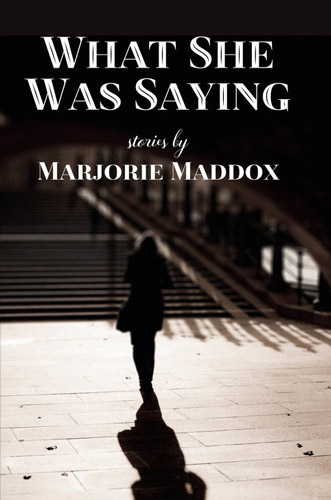What She Was Saying
Regardless of how “evolved” our literary tastes may be, it’s probably safe to say that, amid the busy-ness of our lives, we may occasionally neglect to make time (or create the headspace) for subtleties, the nuances that allow us to reach a more tender place within ourselves, a place capable of recognizing that very tenderness within others. This is precisely the reason that What She Was Saying by Marjorie Maddox is a collection meant to be read during times of stillness, as a reprieve from the dissonance and incessant clatter of the world around us, so as to prevent the story beneath the story from being lost amid the din.
Regardless of how “evolved” our literary tastes may be, it’s probably safe to say that, amid the busy-ness of our lives, we may occasionally neglect to make time (or create the headspace) for subtleties, the nuances that allow us to reach a more tender place within ourselves, a place capable of recognizing that very tenderness within others. This is precisely the reason that What She Was Saying by Marjorie Maddox is a collection meant to be read during times of stillness, as a reprieve from the dissonance and incessant clatter of the world around us, so as to prevent the story beneath the story from being lost amid the din.
“Crowned,” the first piece presented, was by far the strongest. The tale of a preacher and his daughter, written from her perspective, discusses the oh-too familiar process of settling in a new town. Here the father provides comfort to so many members of his congregation while the daughter inevitably becomes festival queen, only to find themselves packing up and moving on within a matter of weeks. The reader is likely to find themselves on high-alert, sure that there must be a reason for the family having to pick up time and time again yet simply can’t deduce why . . . until Maddox deems the time right, leaving readers stunned and just slightly slack-jawed.
Another beautifully crafted tale emerges within “A Wave Rushed Over,” which addresses the complexity of emotions involved in navigating familial expectations against a backdrop of staunch Catholicism and a desire to know the joys of motherhood for oneself. Once again, the author’s adeptness at cultivating nuance allows for resolution (or the painfully ironic loss of it) to be found precisely where the reader least expects it to be.
Then, there is “UPS Guy,” perhaps the only quirkily lighthearted tale in the bunch, which offers the perspectives of three neighbors and a delivery man, each in his or her own voice. While revealing their own agendas and idiosyncrasies to the reader, they perform their nosy-neighbor dance, day in and day out, oblivious to the other, truer, dynamics at play. After all, their perceptions tend toward the literary, for if their perception of reality is not filtered through love poems or sordid romances, it’s nonetheless likely to be more than a bit embellished by the workings of their writerly minds.
The collection, overall, is extremely well-crafted. The attention to detail—the awareness of surroundings, internal sensations, sights and sounds—brought me right into the scene. Often, through the supporting characters’ words and actions, I was able to determine precisely what hand the protagonist was dealt. However, as cognizant as I am that simply getting through the day can, at times, be an accomplishment, I kept hoping for something more, including a few stronger female protagonists. The number of those wracked with anxiety and an overriding sense of victimhood in the midst of relatively comfortable circumstances left me somewhat deflated and with a fair amount of compassion fatigue.
Regardless, What She Was Saying shows Maddox as a masterful and insightful storyteller. There is plenty to be gleaned even for a pull-yourself-up-by-the-bootstraps sort of girl such as myself. It may just take a few breaks between tales to appreciate the vulnerability that we rough and tumble ones have lost in our own hard-fought grapple with life.





